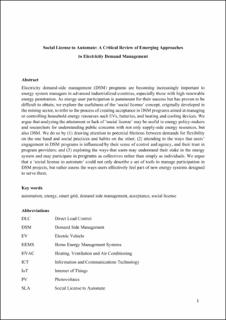Social license to automate: A critical review of emerging approaches to electricity demand management
Adams, Sophie; Kuch, Declan; Diamond, Lisa; Fröhlich, Peter; Henriksen, Ida Marie; Kattzeff, Cecilia; Ryghaug, Marianne; Yilmaz, Selin
Journal article
Submitted version

Åpne
Permanent lenke
https://hdl.handle.net/11250/2979256Utgivelsesdato
2021Metadata
Vis full innførselSamlinger
Sammendrag
Electricity demand-side management (DSM) programs are becoming increasingly important to energy system managers in advanced industrialized countries, especially those with high renewable energy penetration. As energy user participation is paramount for their success but has proven to be difficult to obtain, we explore the usefulness of the ‘social license’ concept, originally developed in the mining sector, to refer to the process of creating acceptance in DSM programs aimed at managing or controlling household energy resources such EVs, batteries, and heating and cooling devices. We argue that analyzing the attainment or lack of ‘social license’ may be useful to energy policy-makers and researchers for understanding public concerns with not only supply-side energy resources, but also DSM. We do so by (1) drawing attention to potential frictions between demands for flexibility on the one hand and social practices and habits on the other; (2) attending to the ways that users’ engagement in DSM programs is influenced by their sense of control and agency, and their trust in program providers; and (3) exploring the ways that users may understand their stake in the energy system and may participate in programs as collectives rather than simply as individuals. We argue that a ‘social license to automate’ could not only describe a set of tools to manage participation in DSM projects, but rather assess the ways users effectively feel part of new energy systems designed to serve them.